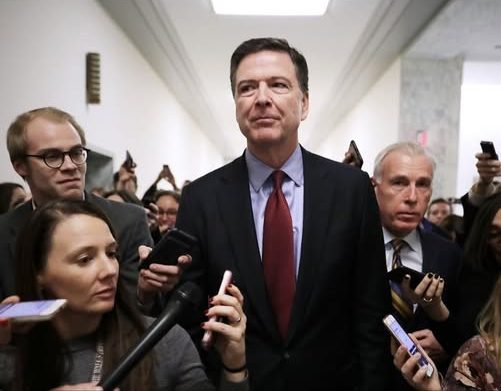The federal judge tasked with overseeing the criminal case against former FBI Director James Comey is earning attention for both his professional record and his unflappable personality — a temperament that colleagues say may prove essential as he presides over one of the most politically charged trials of President Donald Trump’s second term.
U.S. District Judge Michael Nachmanoff, appointed to the federal bench by President Joe Biden in 2021, has long been known for his even-handed approach to the law. A former public defender who holds a fourth-degree black belt in Shotokan Fudokan karate, Nachmanoff has built a career around discipline, patience, and composure under pressure — qualities that legal experts say will be tested in the months ahead.
A Judge Known for Discipline and Balance
Born and raised in Virginia, Michael Nachmanoff developed a reputation early in his career as a jurist committed to fairness, regardless of political winds. His background in martial arts, colleagues say, reflects his philosophy on the bench: stay calm, stay focused, and let facts — not emotions — guide decisions.
“Judge Nachmanoff has always been an even-tempered and deeply disciplined jurist,” one federal attorney told CNN, which profiled the judge ahead of Comey’s arraignment. “He doesn’t let outside pressure interfere with his role, and he’s not one to seek the spotlight.”
Those who have appeared before him — both defense and prosecution — describe him as meticulous, fair, and uninterested in grandstanding. “He’s the kind of judge who listens carefully, cuts through the noise, and focuses on the law,” another lawyer familiar with his courtroom style said.
Nachmanoff’s judicial philosophy, according to those who know him, is grounded in respect for due process and the rule of law — principles that could be critical as he manages the high-stakes prosecution of James Comey, a case already steeped in controversy.
The Comey Indictment and Political Pressure
Comey, who served as FBI Director from 2013 to 2017, was indicted last month on federal charges of making false statements and obstructing a congressional proceeding. The indictment stems from allegations that he lied during testimony before Congress in 2020 regarding the FBI’s handling of classified materials and internal investigations.
Comey appeared in Nachmanoff’s Alexandria courtroom on Wednesday for his arraignment, pleading not guilty to all charges. Prosecutors allege that Comey knowingly misled lawmakers during sworn testimony, though his legal team has insisted the case is “politically motivated.”
The trial, expected to draw global media attention, will likely test both the Justice Department and the federal judiciary’s ability to maintain impartiality amid heightened partisanship. And for Judge Nachmanoff, that means navigating an atmosphere where every decision will be scrutinized by the public, pundits, and politicians alike.
‘An Apolitical Judge’
Attorneys who have appeared before Nachmanoff describe him as “apolitical” — a rare label in today’s politically charged judicial climate.
“I would call him an apolitical judge,” said Kevin Carroll, a Virginia-based attorney who appeared before Nachmanoff earlier this year. “The judge hasn’t brought politics into it at all. It’s just been straight legal discussion.”
Carroll’s comments echo the sentiments of others who’ve interacted with Nachmanoff over the years. Robert Jenkins, a white-collar defense attorney, told reporters that he has “great confidence” in Nachmanoff’s ability to separate politics from law.
“When I learned about the case being assigned to him, I had a great sense that if this is just a politically motivated prosecution, he will discover the right way to deal with it, to make sure that justice is served,” Jenkins said. “If there is true merit to the allegations, I think he’ll do likewise, because he’s fair and committed to doing the right thing.”
From Magistrate to Federal Judge
Before being appointed to his current position, Nachmanoff served as a magistrate judge in the same Alexandria courthouse. His tenure as a magistrate included several high-profile cases that gave him experience managing complex federal proceedings.
In 2019, during former President Trump’s first term, Nachmanoff oversaw the initial court appearances for Lev Parnas and Igor Fruman, two associates of Trump ally Rudy Giuliani, who faced campaign finance violation charges. At the time, Nachmanoff ordered both men released on $1 million secured bonds, demonstrating both firmness and measured restraint.
His judicial record reflects a steady, low-profile approach. Unlike some federal judges who use their benches as platforms for political commentary, Nachmanoff is known for maintaining neutrality — a quality that may help preserve public trust during the highly politicized Comey proceedings.
A Biden Appointee with Bipartisan Respect
Although appointed by President Biden, Nachmanoff’s nomination drew bipartisan support in the Senate, with three Republican senators joining Democrats to confirm him to a lifetime appointment in 2021. Legal analysts note that such bipartisan backing is increasingly rare in modern judicial confirmations, reflecting the widespread respect Nachmanoff commands within Virginia’s legal community.
Since his confirmation, he has presided over several noteworthy cases, including a 2024 jury trial that led to the conviction of a former health care worker accused of illegally accessing the late Justice Ruth Bader Ginsburg’s medical records. He also handled a civil suit involving a CIA physician who claimed she was forced out of her position under political pressure — another case where he was praised for keeping proceedings focused squarely on the facts rather than politics.
Calm in the Eye of the Storm
The Comey case is expected to draw massive attention from both sides of the political spectrum. For Trump supporters, the charges represent long-awaited accountability for an official they view as central to efforts to undermine the former president. For critics, the indictment raises concerns about politicized prosecutions.
Whatever the reaction, Nachmanoff’s challenge will be to maintain balance and order in a case that could further polarize the nation. His background in martial arts may seem like an unusual credential for a judge, but colleagues say it captures his essence perfectly.
“His training in karate isn’t just a hobby,” one court staffer noted. “It’s part of his mental framework — stay centered, stay calm, and never lose focus, no matter how intense things get.”
What Comes Next
With Comey pleading not guilty, pretrial motions are expected to begin soon. Legal experts anticipate months of filings, discovery disputes, and potential efforts by the defense to have the case dismissed. Judge Nachmanoff will need to balance transparency and confidentiality, ensuring a fair trial that respects both public interest and the rights of the accused.
As the nation watches, his demeanor — calm, deliberate, and unshaken — may prove just as important as his rulings.
“Judge Nachmanoff doesn’t get rattled,” one former colleague said. “He’s the kind of judge who can walk into chaos and bring it to order. If there’s anyone who can handle the Comey case without letting politics take over, it’s him.”

James Jenkins is a celebrated Pulitzer Prize-winning author whose work has reshaped the way readers think about social justice and human rights in America. Raised in Atlanta, Georgia, James grew up in a community that instilled in him both resilience and a strong sense of responsibility toward others. After studying political science and creative writing at Howard University, he worked as a journalist covering civil rights issues before dedicating himself fully to fiction. His novels are known for their sharp, empathetic portraits of marginalized communities and for weaving personal stories with broader political realities. Jenkins’s breakout novel, Shadows of Freedom, won national acclaim for its unflinching look at systemic inequality, while his more recent works explore themes of identity, resilience, and the fight for dignity in the face of oppression. Beyond his novels, James is an active public speaker, lecturing at universities and participating in nonprofit initiatives that support literacy and community empowerment. He believes that storytelling is a way to preserve history and inspire change. When not writing, James enjoys jazz music, mentoring young writers, and traveling with his family to explore cultures and stories around the world.









